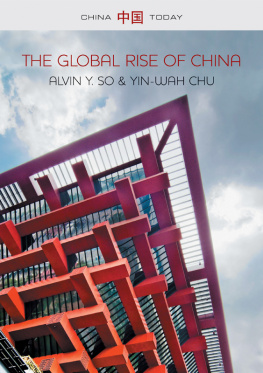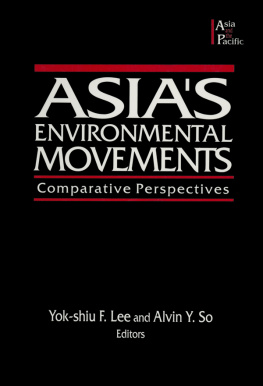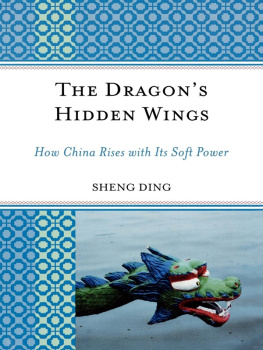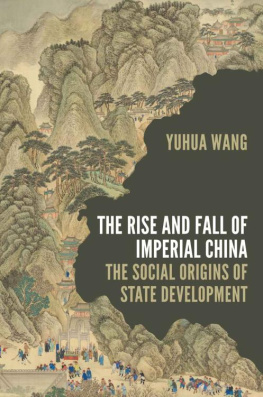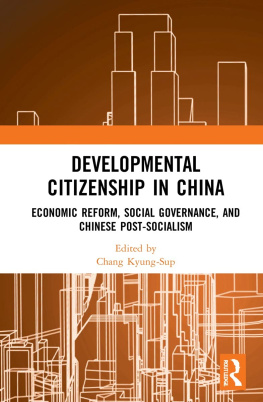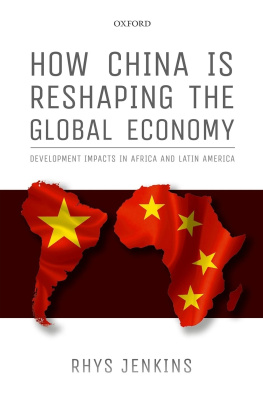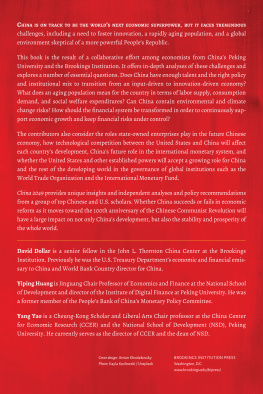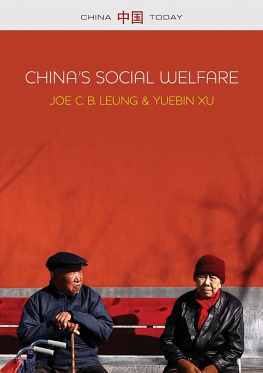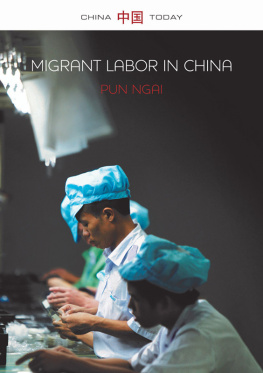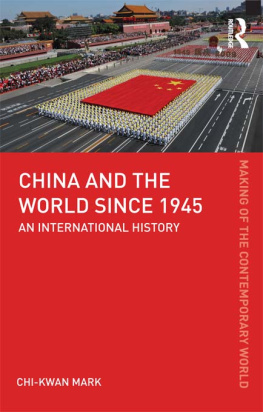
Series page
China Today series
- Greg Austin, Cyber Policy in China
- Steven M. Goldstein, China and Taiwan
- David S. G. Goodman, Class in Contemporary China
- Stuart Harris, China's Foreign Policy
- Elaine Jeffreys with Haiqing Yu, Sex in China
- You Ji, China's Military Transformation
- Michael Keane, Creative Industries in China
- Joe C. B. Leung and Yuebin Xu, China's Social Welfare
- Orna Naftali, Children in China
- Pitman B. Potter, China's Legal System
- Xuefei Ren, Urban China
- Judith Shapiro, China's Environmental Challenges 2nd Edition
- Alvin Y. So and Yin-wah Chu, The Global Rise of China
- Teresa Wright, Party and State in Post-Mao China
- LiAnne Yu, Consumption in China
- Xiaowei Zang, Ethnicity in China
Copyright page
Copyright Alvin Y. So and Yin-wah Chu 2016
The right of Alvin Y. So and Yin-wah Chu to be identified as Authors of this Work has been asserted in accordance with the UK Copyright, Designs and Patents Act 1988.
First published in 2016 by Polity Press
Polity Press
65 Bridge Street
Cambridge CB2 1UR, UK
Polity Press
350 Main Street
Malden, MA 02148, USA
All rights reserved. Except for the quotation of short passages for the purpose of criticism and review, no part of this publication may be reproduced, stored in a retrieval system, or transmitted, in any form or by any means, electronic, mechanical, photocopying, recording or otherwise, without the prior permission of the publisher.
ISBN-13: 978-0-7456-6473-6
ISBN-13: 978-0-7456-6474-3 (pb)
A catalogue record for this book is available from the British Library.
Library of Congress Cataloging-in-Publication Data
So, Alvin Y., 1953
The global rise of China / Alvin Y. So, Yin-wah Chu.
pages cm
Includes bibliographical references and index.
ISBN 978-0-7456-6473-6 (hardback : alk. paper) ISBN 978-0-7456-6474-3 (pbk. : alk. paper) 1. ChinaEconomic policy2000- 2. ChinaForeign economic relations. 3. ChinaForeign relations1976- I. Chu, Yin-wah. II. Title.
HC435.3.S587 2015
337.51dc23
2015011705
Typeset in 11.5 on 15 pt Adobe Jenson Pro
by Toppan Best-set Premedia Limited
Printed and bound in the UK by Clays Ltd, St Ives PLC
The publisher has used its best endeavours to ensure that the URLs for external websites referred to in this book are correct and active at the time of going to press. However, the publisher has no responsibility for the websites and can make no guarantee that a site will remain live or that the content is or will remain appropriate.
Every effort has been made to trace all copyright holders, but if any have been inadvertently overlooked the publisher will be pleased to include any necessary credits in any subsequent reprint or edition.
For further information on Polity, visit our website:
politybooks.com
Dedication
This book is dedicated to our teachers, colleagues, friends, and students in Hong Kong
Map
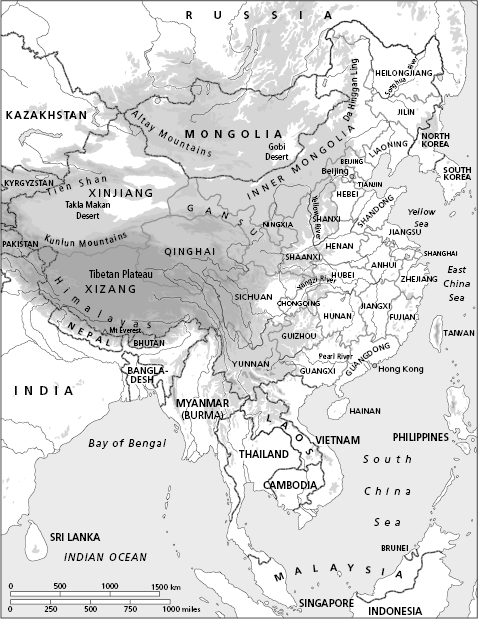
Chronology
| 189495 | First Sino-Japanese War |
| 1911 | Fall of the Qing dynasty |
| 1912 | Republic of China established under Sun Yat-sen |
| 1927 | Split between Nationalists (KMT) and Communists (CCP); civil war begins |
| 19345 | CCP under Mao Zedong evades KMT in Long March |
| December 1937 | Nanjing Massacre |
| 193745 | Second Sino-Japanese War |
| 19459 | Civil war between KMT and CCP resumes |
| October 1949 | KMT retreats to Taiwan; Mao founds People's Republic of China (PRC) |
| 19503 | Korean War |
| 19537 | First Five-Year Plan; PRC adopts Soviet-style economic planning |
| 1954 | First constitution of the PRC and first meeting of the National People's Congress |
| 19567 | Hundred Flowers Movement, a brief period of open political debate |
| 1957 | Anti-Rightist Movement |
| 195860 | Great Leap Forward, an effort to transform China through rapid industrialization and collectivization |
| March 1959 | Tibetan Uprising in Lhasa; Dalai Lama flees to India |
| 195961 | Three Hard Years, widespread famine with tens of millions of deaths |
| 1960 | Sino-Soviet split |
| 1962 | Sino-Indian War |
| October 1964 | First PRC atomic bomb detonation |
| 196676 | Great Proletarian Cultural Revolution; Mao reasserts power |
| February 1972 | President Richard Nixon visits China; Shanghai Communiqu pledges to normalize USChina relations |
| September 1976 | Death of Mao Zedong |
| October 1976 | Ultra-Leftist Gang of Four arrested and sentenced |
| December 1978 | Deng Xiaoping assumes power; launches Four Modernizations and economic reforms |
| 1978 | One-child family planning policy introduced |
| 1979 | US and China establish formal diplomatic ties; Deng Xiaoping visits Washington |
| Sino-Vietnamese War |
| 1982 | Census reports PRC population at more than one billion |
| December 1984 | Margaret Thatcher co-signs Sino-British Joint Declaration agreeing to return Hong Kong to China in 1997 |
| 1989 | Tiananmen Square protests culminate in June 4 military crackdown |
| 1992 | Deng Xiaoping's Southern Inspection Tour reenergizes economic reforms |
| 19932002 | Jiang Zemin, President of PRC, continues economic growth agenda |
| November 2001 | World Trade Organization accepts China as member |
| 20012 | Hu Jintao, General-Secretary of CCP (and President of PRC from 2003) |
| 20023 | SARS outbreak concentrated in PRC and Hong Kong |
| 2006 | PRC supplants US as largest CO2 emitter |
| August 2008 | Summer Olympic Games in Beijing |
| 2010 | Shanghai World Exposition |
| 2012 | Xi Jinping appointed General-Secretary of the CCP (and President of PRC from 2013) |
Preface
We still remember vividly our first trips to China. Alvin visited in the early 1970s when the country first opened its door to foreign visitors at the tail end of the Cultural Revolution. China was at that time a typical poor third world nation: the border city of Shenzhen had no building taller than four floors; restaurants closed at 8 p.m. The street light in the city was very dim and the stores closed very early, so there was not much city life after dark. Even when the stores were open, however, there was nothing for customers to buy except for some very simple necessities. A black-and-white TV, a refrigerator, or an electric fan was considered to be a luxury that few Chinese citizens could afford. No one owned a car, and everyone rode a bicycle or walked to work. Yin-wah's first visit was to her parents remote native village situated at the northern part of Guangdong province in the early 1980s. Everywhere there were lush paddy fields and, blessed with a hydropower dam located at the upper reach of the village's river, villagers got a free electricity supply, allowing them to turn on their lights after dark, which was a rare sight in the region. People were optimistic; an entrepreneurial teenage boy took the initiative to contract out pieces of grassland to herd geese.
Next page
